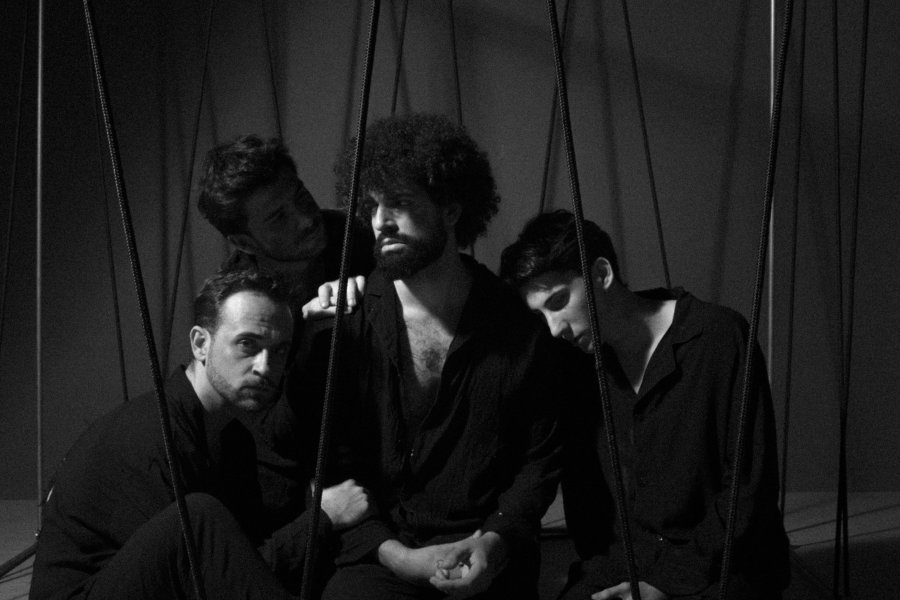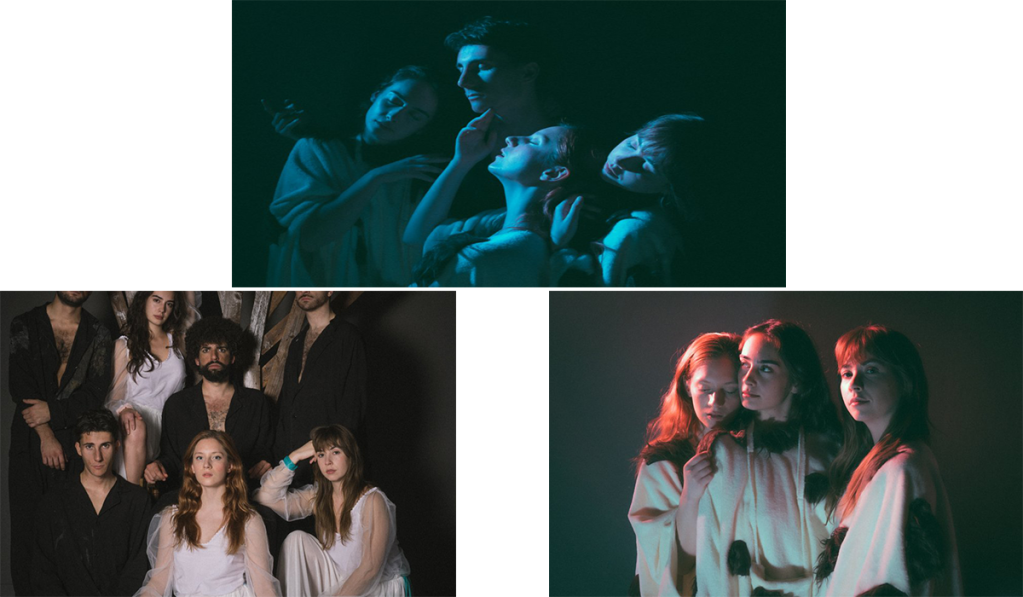«…And they put handcuffs on the flowers»

Ha sido todo un descubrimiento, la Sala Mirador, en pleno barrio de Embajadores, al fondo de una antigua corrala, Una sala pequeña llena de sabor y sugerencias, con el escenario a pie de sala, diáfano, minimalista. Y ahí la obra de Fernando Arrabal, “…Y pusieron esposas a las flores”. No lo puedo creer, pero es. Es la primera vez que se representa en España. Como si aún nos diera miedo poner en escena las cárceles franquistas.
It has been quite a discovery, the Sala Mirador, in the heart of the Embajadores neighborhood, at the back of an old corrala. A small room full of flavor and suggestions, with the stage at the foot of the room, open-plan, minimalist. And there is the work of Fernando Arrabal, “…And they put handcuffs on the flowers.” I can’t believe it, but it is. It is the first time that it is performed in Spain. As if we were still afraid of putting Franco’s prisons on stage.
Fernando Arrabal lleva setenta de sus noventa y un años viviendo y trabajando en Paris. Autoexiliado, por convicción y necesidad democrática y para poder desarrollar la extraordinaria producción de una mente tan prolífica como la del Fénix de los Ingenios. Él es otro Fénix de los Ingenios. Icono de un surrealismo tardío, creador del Teatro Pánico junto a Topor y Jodorowsky, premiado internacionalmente, pero aún se le debe el Nobel, del que fue finalista en 2005. Pero es Sátrapa Transcendente del Colegio de Patafísica, que es como un Nobel para esta institución. En España en 2019 un Consejo de Ministros le concede la Gran Cruz de la Orden Civil de Alfonso X el Sabio por su trayectoria profesional.
Fernando Arrabal has spent seventy of his ninety-one years living and working in Paris. Self-exiled, out of conviction and democratic necessity and to be able to develop the extraordinary production of a mind as prolific as that of the Phoenix of Wits. He is another Phoenix of Wits. Icon of late surrealism, creator of the Panic Theater together with Topor and Jodorowsky, internationally awarded, but he is still owed the Nobel, for which he was a finalist in 2005. But he is Transcendent Satrap of the College of Pataphysics, which is like a Nobel for this institution. In Spain in 2019, a Council of Ministers awarded him the Grand Cross of the Civil Order of Alfonso X the Wise for his professional career.

Arrabal es conocido y admirado en España, pero mucho más fuera de España, algo que no sorprende a nadie.
Arrabal is known and admired in Spain, but much more so outside of Spain, something that does not surprise anyone.
Vamos con “…Y pusieron esposas a las flores”. Estrenada en Paris en 1969.
Let’s go with «…And they put handcuffs on the flowers.» Premiered in Paris in 1969.
Un cubículo enrejado representa la celda de una cárcel donde tres presos políticos llevan veinticinco años encerrados. Veinticinco años. Un cuarto de siglo. Una vida. Uno de ellos ha perdido el habla. Ha perdido la voz que le quitaron, un trauma muy lógico. Otro,-los nombres no importan- tiene el coraje de seguir enfrentando la realidad, siempre con esperanza de que ésta cambie o sin esperanza para él; y un tercero se ha creado un mundo mental paralelo en plena libertad, en el que da rienda suelta a sus impulsos sexuales, a la necesidad de amar y ser amado, a la vida que podría haber sido y que él, ha transformado en real.
A barred cubicle represents a jail cell where three political prisoners have been locked up for twenty-five years. Twenty five years. A quarter century. A life. One of them has lost his speech. He has lost his voice that was taken away from him, a very logical trauma. Another – the names do not matter – has the courage to continue facing reality, always with the hope that it will change or without hope for him; and a third has created a parallel mental world in complete freedom, in which he gives free rein to his sexual impulses, to the need to love and be loved, to the life that could have been and that he has transformed into real.
De pronto llega un condenado a muerte. Un preso importante, al que podrían salvar las más altas jerarquías de instituciones muy representativas en la sociedad. Pero es ejecutado y resucita como un Cristo de … ahora mismo. ¿Aún con la esperanza de un nuevo mundo tolerante y realmente libre?
Suddenly a man condemned to death arrives. An important prisoner, who could be saved by the highest hierarchies of very representative institutions in society. But he is executed and resurrected as a Christ from… right now. Still hoping for a new tolerant and truly free world?
Dicho así, se dice pronto. Pero hay que verlo en escena, representado por los actores, los tres presos de toda una vida, que para saber lo que se siente estando encerrados, decidieron vivir la experiencia metiéndose en la piel de presos reales. Felipe Lorenzo, Luis del Rosal y Francisco de los Mozos son esos tres personajes que de distinta forma, se niegan a ser muertos en vida.
Said like that, it is said soon. But you have to see it on stage, represented by the actors, the three lifelong prisoners, who to know what it feels like to be locked up, decided to live the experience by putting themselves in the shoes of real prisoners. Felipe Lorenzo, Luis del Rosal and Francisco de los Mozos are those three characters who, in different ways, refuse to be killed in life.
El espacio fuera de la celda está poblado por ellos y los personajes que encarnan Aroa García, Vicenta González y Sara Rodas, tan pletóricos de gesto, movimiento, sentimientos y emociones para dar rienda suelta a la rabia encerrada, a la violencia reprimida, al sexo imposible durante veinticinco años. Auténticas explosiones, en las que la palabra, necesaria para recrear el tiempo, no es lo prioritario, como nunca lo fue desde los orígenes del teatro. La palabra sin la expresión corporal de la emoción, sin el movimiento… es apenas nada. Los directores Daniel Coronado y Nuca López han sabido dotar de una corporalidad, de una carnalidad tan contundente lo que en un principio procede del mundo de las ideas, que sin sombra de duda han patentizado, una vez más, lo que es el teatro: La vida misma, lo que ocurrió, lo que sigue ocurriendo.
The space outside the cell is populated by them and the characters played by Aroa García, Vicenta González and Sara Rodas, so full of gesture, movement, feelings and emotions to give free rein to the locked up rage, the repressed violence, the sex. impossible for twenty-five years. Authentic explosions, in which the word, necessary to recreate time, is not the priority, as it has never been since the origins of theater. The word without the bodily expression of emotion, without movement… is hardly anything. The directors Daniel Coronado and Nuca López have known how to give such a forceful corporality, such a carnality, to what initially comes from the world of ideas, that without a shadow of a doubt they have made clear, once again, what theater is: The life itself, what happened, what continues to happen.

“…Y pusieron esposas a las flores” es un homenaje de Fernando Arrabal a los presos, no solo del franquismo, a los presos del mundo. Es un homenaje a Julián Grimau, el último ejecutado por el franquismo en 1963, el condenado a muerte en la obra, a todos los Julián Grimau de la historia hasta el día de hoy, a quienes sabiamente Arrabal redime en ese Cristo desnudo, resucitado para resucitar la esperanza en una humanidad responsable de un nuevo mundo realmente libre, sin odios ni represalias.
“…And they put handcuffs on the flowers” is a tribute by Fernando Arrabal to the prisoners, not only of the Franco regime, to the prisoners of the world. It is a tribute to Julián Grimau, the last one executed by the Franco regime in 1963, the one condemned to death in the work, to all the Julián Grimau in history to this day, whom Arrabal wisely redeems in that naked Christ, resurrected for resurrect hope in a humanity responsible for a truly free new world, without hatred or reprisals.
La escena que materializa magistralmente Samuel Buitrago, el condenado, crucificado y resucitado que recuerda a ese Jesús de El Greco del Museo del Prado, que se alza ingrávido de su tumba, en levitación asombrosa, para mostrar sin palabras el triunfo del espíritu sobre la materia.
The scene masterfully materialized by Samuel Buitrago, the condemned, crucified and resurrected man who recalls El Greco’s Jesus from the Prado Museum, who rises weightlessly from his tomb, in astonishing levitation, to show without words the triumph of spirit over matter .
Y esa escena inquietante en la que la mujer del condenado, Sara Rodas, trata de salvarle, mediante comunicación telefónica, con un militar, ¿Franco? Un eclesiástico, ¿el Papa? Y un civil, ¿la Justicia?. Conversación tan necesaria como inútil.
And that disturbing scene in which the condemned man’s wife, Sara Rodas, tries to save him, through telephone communication, with a soldier, Franco? An ecclesiastic, the Pope? And a civilian, Justice? Conversation as necessary as it is useless.
Siempre tropezaremos con el ADN humano.
We will always stumble upon human DNA.
Si tienen ocasión, no se la pierdan.
If you have the chance, don’t miss it.
.
Descubre más desde LA AGENCIA MUNDIAL DE PRENSA
Suscríbete y recibe las últimas entradas en tu correo electrónico.


